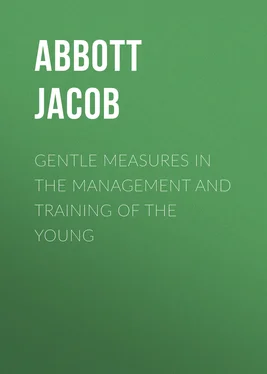Jacob Abbott - Gentle Measures in the Management and Training of the Young
Здесь есть возможность читать онлайн «Jacob Abbott - Gentle Measures in the Management and Training of the Young» — ознакомительный отрывок электронной книги совершенно бесплатно, а после прочтения отрывка купить полную версию. В некоторых случаях можно слушать аудио, скачать через торрент в формате fb2 и присутствует краткое содержание. Жанр: foreign_edu, pedagogy_book, upbringing_book, на английском языке. Описание произведения, (предисловие) а так же отзывы посетителей доступны на портале библиотеки ЛибКат.
- Название:Gentle Measures in the Management and Training of the Young
- Автор:
- Жанр:
- Год:неизвестен
- ISBN:нет данных
- Рейтинг книги:5 / 5. Голосов: 1
-
Избранное:Добавить в избранное
- Отзывы:
-
Ваша оценка:
- 100
- 1
- 2
- 3
- 4
- 5
Gentle Measures in the Management and Training of the Young: краткое содержание, описание и аннотация
Предлагаем к чтению аннотацию, описание, краткое содержание или предисловие (зависит от того, что написал сам автор книги «Gentle Measures in the Management and Training of the Young»). Если вы не нашли необходимую информацию о книге — напишите в комментариях, мы постараемся отыскать её.
Gentle Measures in the Management and Training of the Young — читать онлайн ознакомительный отрывок
Ниже представлен текст книги, разбитый по страницам. Система сохранения места последней прочитанной страницы, позволяет с удобством читать онлайн бесплатно книгу «Gentle Measures in the Management and Training of the Young», без необходимости каждый раз заново искать на чём Вы остановились. Поставьте закладку, и сможете в любой момент перейти на страницу, на которой закончили чтение.
Интервал:
Закладка:
What has been said thus far relates obviously to cases where the mother is at the commencement of her work of training. This is the way to begin ; but you can not begin unless you are at the beginning. If your children are partly grown, and you find that they are not under your command, the difficulty is much greater. The principles which should govern the management are the same, but they can not be applied by means so gentle. The prison, it may be, must now be somewhat more real, the terms of imprisonment somewhat longer, and there may be cases of insubordination so decided as to require the offender to be carried to it by force, on account of his refusal to go of his own accord, and perhaps to be held there, or even to be tied. Cases requiring treatment so decisive as this must be very rare with children under ten years of age; and when they occur, the mother has reason to feel great self-condemnation—or at least great self-abasement—at finding that she has failed so entirely in the first great moral duty of the mother, which is to train her children to complete submission to her authority from the beginning.
Sometimes, however, it happens that children are transferred from one charge to another, so that the one upon whom the duty of government devolves, perhaps only for a time, finds that the child or children put under his or her charge have been trained by previous mismanagement to habits of utter insubordination. I say, trained to such habits, for the practice of allowing children to gain their ends by any particular means is really training them to the use of those means. Thus multitudes of children are taught to disobey, and trained to habits of insubmission and insubordination, by the means most effectually adapted to that end.
When under these circumstances the children come under a new charge, whether permanently or temporarily, the task of re-form in or their characters is more delicate and difficult than where one can begin at the beginning; but the principles are the same, and the success is equally certain. The difficulty is somewhat increased by the fact that the person thus provisionally in charge has often no natural authority over the child, and the circumstances may moreover be such as to make it necessary to abstain carefully from any measures that would lead to difficulty or collision, to cries, complaints to the mother, or any of those other forms of commotion or annoyance, which ungoverned children know so well how to employ in gaining their ends. The mother may be one of those weak-minded women who can never see any thing unreasonable in the crying complaints made by their children against other people. Or she may be sick, and it may be very important to avoid every thing that could agitate or disturb her.
This last was the case of George, a young man of seventeen, who came to spend some time at home after an absence of two years in the city. He found his mother sick, and his little brother, Egbert, utterly insubordinate and unmanageable.
"The first thing I have to do," said George to himself, when he observed how things were, "is to get command of Egbert;" and as the first lesson which he gave his little brother illustrates well the principle of gentle but efficient punishment, I will give it here.
Egbert was ten years of age. He was very fond of going a-fishing, but he was not allowed to go alone. His mother, very weak and vacillating about some things, was extremely decided about this. So Egbert had learned to submit to this restriction, as he would have done to all others if his mother had been equally decided in respect to all.
The first thing that Egbert thought of the next morning after his brother's return was that George might go a-fishing with him.
"I don't know," replied George, in a hesitating and doubtful tone. "I don't know whether it will do for me to go a-fishing with you. I don't know whether I can depend upon your always obeying me and doing as I say."
Egbert made very positive promises, and so it was decided to go. George took great interest in helping Egbert about his fishing-tackle, and did all in his power in other ways to establish friendly relations with him, and at length they set out. They walked a little distance down what was in the winter a wood road, and then came to a place where two paths led into a wood. Either of them led to the river. But there was a brook to cross, and for one of these paths there was a bridge. There was none for the other. George said that they would take the former. Egbert, however, paid no regard to this direction, but saying simply "No, I'd rather go this way," walked off in the other path.
"I was afraid you would not obey me," said George, and then turned and followed Egbert into the forbidden path, without making any further objection. Egbert concluded at once that he should find George as easily to be managed as he had found other people.
When they came in sight of the brook, George saw that there was a narrow log across it, in guise of a bridge. He called out to Egbert, who had gone on before him, not to go over the log until he came. But Egbert called back in reply that there was no danger, that he could go across alone, and so went boldly over. George, on arriving at the brook, and finding that the log was firm and strong, followed Egbert over it. "I told you I could go across it," said Egbert. "Yes," replied George, "and you were right in that. You did cross it. The log is very steady. I think it makes quite a good bridge."
Egbert said he could hop across it on one foot, and George gave him leave to try, while he, George, held his fishing-pole for him. George followed him over the log, and then told him that he was very sorry to say it, but that he found that they could not go a-fishing that day. Egbert wished to know the reason. George said it was a private reason and he could not tell him then, but that he would tell him that evening after he had gone to bed. There was a story about it, too, he said, that he would tell him at the same time.
Egbert was curious to know what the reason could be for changing the plan, and also to hear the story. Still he was extremely disappointed in having to lose his fishing, and very much disposed to be angry with George for not going on. It was, however, difficult to get very angry without knowing George's reason, and George, though he said that the reason was a good one—that it was a serious difficulty in the way of going a-fishing that day, which had only come to his knowledge since they left home, steadily persisted in declining to explain what the difficulty was until the evening, and began slowly to walk back toward the house.
Egbert then declared that, at any rate, he would not go home. If he could not go a-fishing he would stay there in the woods. George readily fell in with this idea. "Here is a nice place for me to sit down on this flat rock under the trees," said he, "and I have got a book in my pocket. You can play about in the woods as long as you please. Perhaps you will see a squirrel; if you do, tell me, and I will come and help you catch him." So saying, he took out his book and sat down under the trees and began to read. Egbert, after loitering about sullenly a few minutes, began to walk up the path, and said that he was going home.
George, however, soon succeeded in putting him in good-humor again by talking with him in a friendly manner, and without manifesting any signs of displeasure, and also by playing with him on the way. He took care to keep on friendly terms with him all the afternoon, aiding him in his various undertakings, and contributing to his amusement in every way as much as he could, while he made no complaint, and expressed no dissatisfaction with him in any way whatever.
Читать дальшеИнтервал:
Закладка:
Похожие книги на «Gentle Measures in the Management and Training of the Young»
Представляем Вашему вниманию похожие книги на «Gentle Measures in the Management and Training of the Young» списком для выбора. Мы отобрали схожую по названию и смыслу литературу в надежде предоставить читателям больше вариантов отыскать новые, интересные, ещё непрочитанные произведения.
Обсуждение, отзывы о книге «Gentle Measures in the Management and Training of the Young» и просто собственные мнения читателей. Оставьте ваши комментарии, напишите, что Вы думаете о произведении, его смысле или главных героях. Укажите что конкретно понравилось, а что нет, и почему Вы так считаете.












